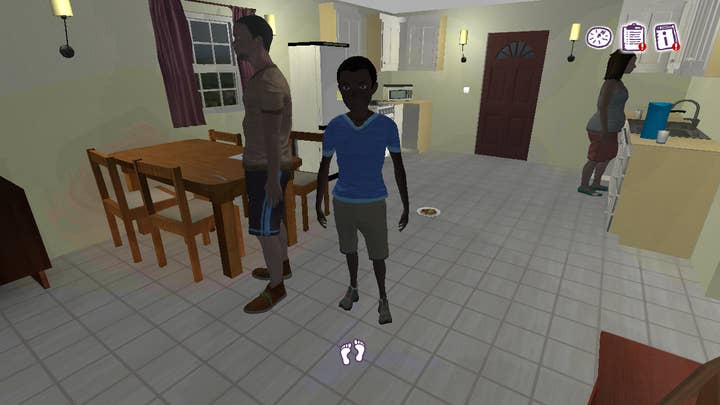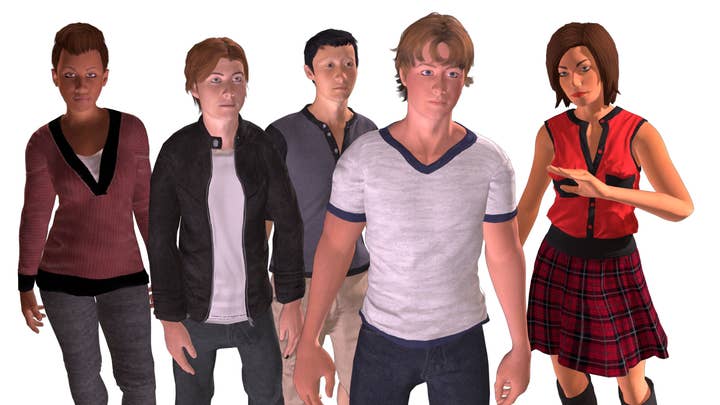Can a video game prevent domestic violence?
We speak to Professor Adele Jones about her ongoing work to tackle abuse and the attitudes that lead to it
October is Domestic Violence Awareness Month and has been since 1987. But despite the ongoing efforts of several organisations around the world, there are still victims suffering in silence that need to be reached.
One such leader in the fight against domestic violence is Adele Jones, a Professor of Social Work at the University of Huddersfield. Having researched and studied gender-based violence prevention for decades, she has realised one area has yet to be tackled effectively is people's attitudes towards both the abuse and the views of gender inequality that contribute to it.
These attitudes can be found within young people, and Jones believes if these views can be changed at an adolescent age before they become internalised, then there's a long-term opportunity to prevent the behaviours that often lead to violence. And video games may hold the answer.
"There is no doubt that young people are engaged by games in a way that doesn't require an adult to stand over and intervene"
While she, by her own admission, doesn't know much about the gaming world, the professor knows it engages young people and could be a useful tool to accomplishing her aims.
"What young people get out of it may be difficult for me to fathom, but there is no doubt they're engaged by games in a way that doesn't require an adult to stand over and intervene," she tells GamesIndustry.biz. "So I wondered how it would be to look at gaming as a possible way to reach young people.
"It turns out there is a growing body of work around serious games, where computer games are used to tackle social problems. [My team and I] researched some of those and decided this is what we would do."

The team - based at the None In Three Centre, the name taken from research that shows one in three women will experience sexual or physical violence in their lifetime - received funding from the EU's human rights program. They used it to work for two years in two Caribbean countries - Barbados and Grenada - where they could research domestic violence and the effect it had on children.
A survey of over 1,400 children showed that regular exposure to violence leads to young people believing that violence is normal and reduces their empathy for victims - factors which increase their risk of repeating the violence they have witnessed. Other research by Jones and her team of Caribbean experts was then used as the basis for the storyline, characters and themes in a video game - one of five creative projects Jones' team worked on.
The game was called Jesse and told the story of its titular ten-year-old boy (although the name was chosen because it could be seen as gender neutral). A 3D point-and-click adventure, it puts players in the role of Jesse, who lived with his pregnant mother and her abusive boyfriend, on whom she depends financially. They work through five levels, starting with a violent incident at home where they can choose what the child does after his mother is hurt.
"Domestic violence legislation has now been extended to include young people, and that's really quite important"
A level in hospital shows the impact of violence on the unborn child, as well as the role of health professionals, while a scene in a classroom explores the effect of violence at home on Jesse's own behaviour, how he also becomes aggressive and his grades begin to slip. There are even levels focusing on the boyfriend, how he's acting out the violence he himself experienced as a child, and how he is challenged by his friends over his behaviour, highlighting the importance of other men helping to bring about the changes needed.
Jesse is very much an educational tool, and one accompanied by notes and discussion points for teachers. It was trialled in schools, where children would play through a level each day followed by a class discussion as to what they would or should do in that situation.
"It's not a sophisticated game," Jones admits. "We had one game developer and a very part-time professor working on it, but that's not a problem for children. What they liked is it was very authentic to their reality.
"We even put in real-world information, like the helplines and the ambulance service - that's real-world information that children should learn to utilise."

A survey of over 400 children showed how effective the game was and how much children were able to empathise with its characters. Jones reports the game "really was able to make a difference in how young people felt about violence", and has led to not one follow-up title but four.
None In Three was able to secure grants worth £4.6 million to create similar games for other countries, including India, Jamaica, Uganda and the UK. Meanwhile, Jesse is being implemented in schools across a third Caribbean country, St Lucia.
"By building real-world information into the game, we can help children know what helplines to call, to know that violence isn't acceptable, to know something can be done"
For each country, the games Jones' team are working on will focus on a different form of gender-based violence. The Ugandan title, for example, explores attitudes that contribute to child marriage being seen as normal, while the UK game will centre around partner violence within teenage relationships, including cyberbullying.
"There is growing recognition in the government that violence within adolescent relationships is a very key problem and the government has addressed that with legislation," Jones says, elaborating on the themes of the UK game. "Domestic violence legislation has now been extended to include young people, and that's really quite important.
"But there are no proven interventions in the UK that we are aware of that focus on violence within adolescent relationships, despite the fact that there's a growing body of research that says we need to tackle this. If we can tackle it now, we have the chance to stop domestic violence becoming a lifelong career for some, primarily men."
While men are often perpetrators of violence, research shows that boys and young males can also be victims of it, and Jones says "not enough is being done to address that".
She adds: "We're very keen to make sure that we don't just focus on females as victims and males as perpetrators - even in Jesse, although the male is a perpetrator, we do recognise he was also the child of violence in the home. He was himself a victim before he became a perpetrator and we also recognise that men have much to offer in terms of solutions. Most of the positive role models in that game are actually male, and that's been drawn out of the research findings."
"We have the chance to stop domestic violence becoming a lifelong career for some, primarily men"
The next wave of games are still in the research phase, but the ideas for their storylines, themes and characters are already taking shape. The researchers will then work with a dedicated gaming team established at the University of Huddersfield and roll out the finished project to schools for trial.
"Attacking violence has become such of crucial part of even the school curriculum, because there's such a growth of violence in schools and we know that it is very often connected to violence in the home," Jones explains. "It's become really crucial to have tools that teachers can use.
"The great thing about Jesse is children loved the game. We even trialled it with a group of children in the UK and given that the majority of those children were white English, I wasn't sure to what extent they would relate to the characters. But the story is precisely the same kind of stories that many of those children in the UK were familiar with - it was just that the characters were black. So they were very able to relate to them.
"I think what they particularly liked was that they were about engage with something that didn't require having an adult be part of your learning. It was just them interacting with the game."

Jesse has also been trialled with young offenders, and Jones says the positive impact here has paved the way for the game to be used as part of the rehabilitation process. In fact, one regional body in the Caribbean is considering using it as part of its juvenile restorative program and Jones has recently met with magistrates from the region to talk about using Jesse as a professional training tool.
These efforts go beyond raising awareness, but are a full-fledged push towards prevention. Research shows a primary trait among the people who commit violence is the lack of empathy for victims or the lack of understanding that what they're doing is harmful. But the interactive nature of video games can be a powerful tool in encouraging and developing empathy, and that's a crucial step towards prevention.
"Having seen how young people respond to this, I think [games are] a very underutilised tool"
"If you can begin to address that lack of empathy, at the emotional level and follow it with good conversations at the cognitive level, you can get people to start thinking about taking responsibility for their behaviours," says Jones.
"That is one of the major ways of preventing violence. Having good laws and good policies is important but in the moment between two people, it's not legislation that's going to stop someone committing harm. It's going to be someone thinking this is wrong, this is harmful.
"So it's about those internal states and that's really what we're trying to change. It's a long-term goal, and we don't have the capacity to do the longitudinal research, but all the research points to this: that if we can begin to change the attitudes that contribute to violence, then we have more people willing to report violence, more people willing to say they need help if they feel that way.
"A video game is not going to change a child's life, it's virtual. But by building real-world information into the game, we can help children know what helplines to call, to know that violence isn't acceptable, to know something can be done. If a child playing these games are in these sort of situations, they can know at that point where they can go to find help."
As Jones has previously said, she is not a gamer herself nor does she profess to understand much about the medium. But through her work on Jesse and the upcoming follow-up games, she has become impressed not only by the way the medium can engage children and teens but also the impact this can have.
"Having seen how young people respond to this, I think it's a very underutilised tool," she says. "What they have appreciated is that we generated something with them in mind, using a medium they are familiar with.
"We're more likely to reach children through gaming because that's what's attracting them. So I do believe it's an underutilised tool. I don't see it as more than that, it is a tool, it requires everything I've said - the research, the thoughtful storylines, the conversation that would follow after playing. But it is a new tool and I know serious gaming has been used in other parts of the world. There are some amazing projects that really had an impact. And I believe at some point the commercial world will catch on."
